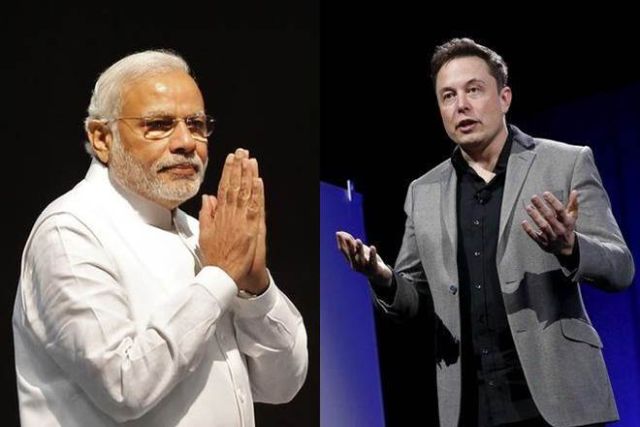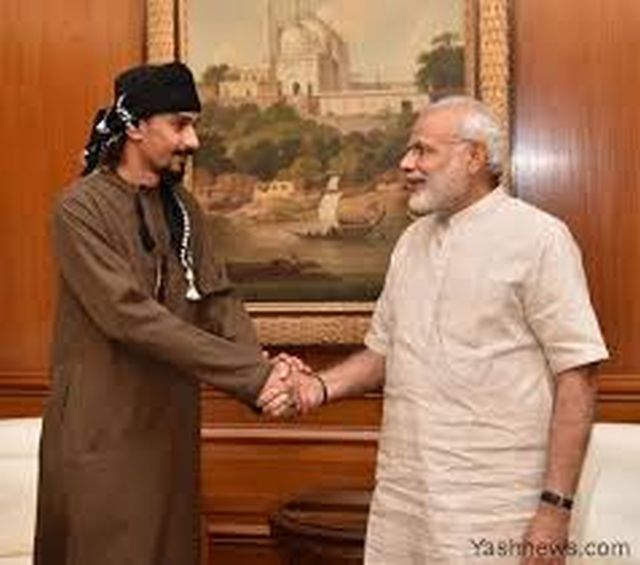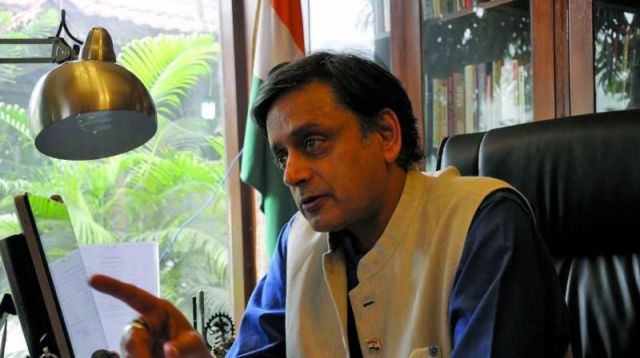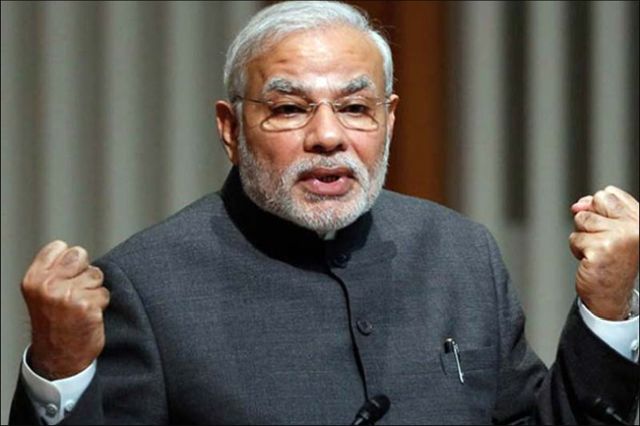
by admin | May 25, 2021 | Opinions

Narendra Modi and Elon Musk
By Rajendra Shende,
“A one-km auto rickshaw ride in Ahmedabad takes Rs 10 and India reached Mars at Rs 7 per km, which is really amazing,” Prime Minister Narendra Modi emphasised the achievement in his speech in New York in September 2014.
He was speaking about the inter-planetary plan of the Indian Space Research Organisation (ISRO) that has disrupted space technologies.
Elon Musk, a dangerously daring dreamer, at that time had a blueprint of a Martian journey on the drawing board of his SpaceX office in California. He not only wants to just send man to Mars, he wants to colonise it. He has planned on taking one million willing people from our blue planet Earth to the red planet by 2022, a journey of 650 million kilometres. To achieve this objective, he has to make the journey affordable and safe.
“Everything about Mangalyaan (ISRO’s space craft to Mars) is indigenous. We reached Mars at a smaller budget than a Hollywood movie (“Gravity”),” Modi stated smugly, adding that “India is the only country to reach Mars on its first attempt. If this is not talent, then what is?”
Indeed, India’s Mars spacecraft catapulted the country into an elite club of three nations, that too at just $74 million. That was a tenth (about $670 million) of NASA’s Mars mission “Maven” that entered the Martian orbit just two days before Modi’s statement.
Surely, Elon Musk was listening to Modi. It must have been a shocker for him because his project to colonise Mars had, and still has, the same objectives as ISRO’s — to reduce space transportation and pay-load carrying costs.
Within the next three years SpaceX developed a family of Falcon-series launch vehicles and the Dragon spacecraft, both of which deliver payloads into the Earth’s orbit at low cost mainly because Musk is able to bring back the launch vehicle for reuse.
During the same three years, ISRO became one of the world’s top space-runners. It is now a technology giant that is championing and taming space launches. It is no longer just a government-funded agency but a commercial venture that can launch other countries’ satellites through its massive launch vehicles — the GSLVs and the PSLVs. These are capable of carrying heavy payloads of satellites into space.
The ambitions, aspirations and potential of ISRO and Space X have started to demonstrate amazingly clear similarity.
When Space X was busy announcing the contract with two private individuals to send them in a Dragon spacecraft around the Moon, ISRO had already fired its PSLV and launched 104 satellites into space from a single vehicle. While Moon tourism is Space X’s business proposition, taking other countries’ satellites into space is ISRO’s.
Of the 104 satellites launched at one go, a whopping 96 belonged to the US, which paid India for the launch. The satellites, released in rapid-fire fashion every few seconds from a single rocket as it travelled at 30,000 kms an hour is like testing the limits of technology.
On January 12, 2018, ISRO soared again. This time it launched 31 satellites during a single mission that included three of India’s and 28 of other countries. When the last of the satellite was ejected, it was the 100th satellite of ISRO.
A month later, on February 6, 2018, Elon Musk recaptured the headlines as the Falcon Heavy 9 vehicle, the most powerful ever developed after the one that took man to moon, had carried a payload of his Tesla Roadster with dummy driver into space and toward the Asteroid belt.
It was sort of a gimmick and fun, as per Musk. However, more importantly, the mission was able to bring back to the earth two of the three launch vehicles and they were recovered. The same did not happen with the third vehicle.
ISRO has also announced that it is planning a flight with a “dummy crew module”, which is part of a programme for the development of critical technologies that it seeks to develop as part of its “human space-flight programme”.
Now is the time for Modi and Musk to collaborate as equal partners, particularly under Modi’s pet project of “Make in India”. Both of them need to recognise this as there are not only excellent convergence of the attributes and traits between Space X and ISRO, but also between Musk and Modi.
All of Elon Musk’s projects — electric cars that have captured the imagination of almost all governments, lithium batteries that can break long-standing barriers for solar energy, Tesla Solar Roof Tiles that can turn every home into a power plant, car elevators and Underground Tunnels that will drastically reduce use of fossil fuels, Hyperloop for sustainable transport — are all path-breaking innovations that can make dependence on fossil fuels history.
Modi has a unique opportunity for de-politicising climate change and space exploration, and take global leadership by partnering with Musk. It would in turn help Indian aspirations of eradicating poverty and making gainful employment.
(Rajendra Shende is Chairman, TERRE Policy Centre, and Director, UNEP. The views expressed are personal. He can be contacted at shende.rajendra@gmail.com)
—IANS

by admin | May 25, 2021 | Business, Emerging Businesses, Investing, SMEs
 Muscat : Indian Prime Minister Narendra Modi on Monday invited Omani businesses to invest in the country as he showcased the government’s initiatives to further ease doing of business in the “New India”.
Muscat : Indian Prime Minister Narendra Modi on Monday invited Omani businesses to invest in the country as he showcased the government’s initiatives to further ease doing of business in the “New India”.
Addressing around 50 Omani chief executives at the Oman-India Business Meet here, Modi said that the reforms were aimed at preparing India for the 21st century and make it a global manufacturing hub.
He said India was ushering in a knowledge-based technologically driven society which presents many opportunities for Omani businesses.
“Four countries in four-days strengthening our footprint in Gulf and West Asia! PM @narendramodi begins Day 4 with business – Oman-India Business Meet in Muscat. Pitching India as an attractive destination,” Indian External Affairs Ministry spokesperson Raveesh Kumar tweeted.
Listing some of the major reforms by the government in the last over three years, Modi noted that India had climbed to the third position in the global Start-up Index.
On Sunday during his meeting with Sultan of Oman Qaboos Bin Said Al Said, Modi voiced his appreciation of the Indian expatriates for their contributions to Oman’s development.
Oman is home to over 800,000 expatriate Indians and Modi, in a community gathering earlier on Monday, praised their role in the Gulf country’s development.
Following the meeting between Modi and Sultan Qaboos, eight agreements were signed between India and Oman.
These include three memorandums of understanding on cooperation in the fields of health, outer space, diplomacy and defence studies and analyses.
The India-Oman defence cooperation has emerged as a key pillar of the strategic partnership between the two countries.
Oman is a strategic partner of India in the Gulf and an important interlocutor at the Gulf Cooperation Council (GCC), Arab League and Indian Ocean Rim Association (IORA).
Modi arrived here on Sunday evening on the third and final leg of his visit to West Asia and the Gulf that also took him to Palestine and the United Arab Emirates.
—IANS

by admin | May 25, 2021 | Interviews

Shashi Tharoor
By Sarwar Kashani,
New Delhi : Shashi Tharoor, Congress MP and former Minister of State for External Affairs, says Prime Minister Narendra Modi has brought “dynamism” to India’s foreign policy but lacks consistency in the country’s neighbourhood strategy.
In an interview with IANS, Tharoor particularly mentioned Pakistan and China in the light of the unending cross-border exchange of fire and the Doklam standoff, saying it has mostly been a flip-flop approach while dealing with the two immediate neighbours of India that belies the Prime Minister’s “neighborhood first” policy on geoeconomics and geopolitics.
He also said the reduction of foreign policy into “PR and marketing” exercises by the government didn’t bode well for India’s substantive status in the world.
“Modi has brought a lot of energy and dynamism to the conduct of (the country’s) foreign policy. He travels tirelessly and all of this is good. He makes a very energetic impression wherever he goes. That is the positive side,” Tharoor said, counting the Bharatiya Janata Party (BJP) government’s achievements on the foreign front.
He noted that “another positive” was the fact that many of the foreign policy initiatives of India that pre-date Modi continue under the government.
But, Tharoor said, there were areas where “we have concerns”.
“One is the complete incoherence of policy on Pakistan where he has veered up and down, and repeatedly up and down in a way that is not just confusing but bewildering,” he said, noting how a “saree-shawl diplomacy” and attending wedding and birthday celebrations have ended up in a complete “cold war” situation between the two countries.
Tharoor said that, on the one hand, while Modi keeps repeating that there would be no engagement with Pakistan till cross-border terror is stopped, on the other, “suddenly, unexpectedly announcements are made that the NSAs met in Bangkok”.
In the last two years, he said, ithings have become “worse”, referring to the increased number of terrorist activities in Jammu and Kashmir.
And, despite that, National Security Advisor (NSA) Ajit Doval met his Pakistani counterpart Nasir Khan Janjua in Bangkok again on December 25 last year, he said.
“We have seen, sadly, an increase in terror incidents… All of this suggest to me that there is a certain lack of stability and coherence in India’s Pakistan policy that really bodes ill.”
The second aspect of the concern, he said, was about the failure of the government to level with the Indian people on foreign policy issues.
“There is this reduction of foreign policy to PR and marketing which we have seen on the domestic issues. In domestic issues it does less harm, in foreign policy it does more harm because it affects India’s substantive place in the world and also the security of Indians.
He referred to the Doklam stand-off with China “where the whole disengagement was spun as a huge diplomatic victory”.
“It turns out that Chinese have moved only 200 metres away and they have reinforced themselves to an extraordinary extent on the same plateau so that tomorrow whenever snows melt, if we want to move, we will be in no condition to resist without provoking a war.”
He said the September 2016 “surgical strikes” against terror launch pads in Pakistan were also made into “a big triumph having neutralised terrorism.
“And terrorism has actually increased since then. So has the number of cross-border infiltration deaths…”
Tharoor said it was the duty of any Indian government to be honest with its people. “We worry about this over-emphasis on spin and under-emphasis on being straight with the public.”
(Sarwar Kashani can be contacted at sarwar.k@ians.in)
—IANS

by admin | May 25, 2021 | Muslim World
 Abu Dhabi : Indian Prime Minister Narendra Modi will on Sunday lay the foundation stone for the first Hindu temple in the United Arab Emirates’ capital, which is home to a huge Indian diaspora.
Abu Dhabi : Indian Prime Minister Narendra Modi will on Sunday lay the foundation stone for the first Hindu temple in the United Arab Emirates’ capital, which is home to a huge Indian diaspora.
This is Modi’s second visit to the UAE after August 2015. He was scheduled to arrive here in the evening.
“The first Hindu temple in Abu Dhabi will come up on 55,000 square metres of land and the groundbreaking ceremony on Sunday will be a historic event,” said Indian Ambassador to the UAE Navdeep Singh Suri.
The Indian leader will be laying the foundation stone for the temple from the Dubai Opera House via video conferencing. He will also hold a meeting there with the Indian community.
“The occasion is going to be historic… because it will also see the commencement of the first Hindu Temple in Abu Dhabi. We are very pleased that we have received 55,000 square metres of land near Al Rahba off the Dubai-Abu Dhabi Sheikh Zayed Highway,” said Suri.
The temple’s construction will be completed by 2020, and open to people of all religious backgrounds.
It will be the first traditional Hindu stone temple in the Middle East, said a spokesperson from the BAPS Swaminarayanan Sanstha that is entrusted with the design, construction and management of the temple.
The temple will be hand-carved by Indian temple artisans and assembled in the UAE, said the BAPS spokesperson.
The UAE has two Hindu temples which are located in Dubai. Devotees from Abu Dhabi and other emirates have to drive to Dubai for prayers and offerings.
The temple compound will include a visitors’ centre, prayer halls, exhibition centre, learning areas, sports area for children and youths, thematic gardens, water features, a food court, a books and gift shop and other facilities.
Sadhu Brahmaviharidas, the chief spokesperson of BAPS Swaminarayan Sanstha, said the generous gift of land for a Hindu temple by Sheikh Mohamed bin Zayed Al Nahyan, Crown Prince of Abu Dhabi and Deputy Supreme Commander of the UAE Armed Forces, “was a strong and sound message to the world that cultural and spiritual inclusiveness is the way forward for global harmony”.
It will replicate the BAPS temple in New Delhi and the one under construction in New Jersey, a trust member told the Khaleej Times.
BAPS manages 1,200 temples in India, UK, the US, Australia, Canada and Africa.
Meanwhile, the UAE’s iconic buildings like the the Burj Khalifa, Dubai Frame, Adnoc bulding and the Emirates Palace were lit up in colours of India’s flag ahead of Modi’s visit to the country.
Modi’s high-level engagements here include bilateral meetings with top UAE leaders and a keynote address at the World Government Summit in Dubai on Sunday, in which India is the guest country.
Earlier in the day, Modi was in Ramallah where he received a rousing welcome on the first visit by an Indian Prime Minister to Palestine.
—IANS

by admin | May 25, 2021 | Muslim World
 Ramallah : Indian Prime Minister Narendra Modi on Saturday laid a wreath at the mausoleum of Yaser Arafat, the Chairman of the Palestinian Liberation Organisation and the first President of the Palestinian Authority, soon after arriving here.
Ramallah : Indian Prime Minister Narendra Modi on Saturday laid a wreath at the mausoleum of Yaser Arafat, the Chairman of the Palestinian Liberation Organisation and the first President of the Palestinian Authority, soon after arriving here.
The mausoleum complex consists of Arafat’s burial chamber, a prayer pavilion and landscaped gardens — all situated in a 6,550 sq. m. site.
Palestine Prime Minister Rami Hamdallah received Modi as the latter alighted from a chopper that brought him to Ramallah from Amman, Jordan. This is the first ever prime ministerial visit from India to Palestine.
Modi will hold talks with Palestine President Mahmoud Abbas following which a number of agreements are going to be signed.
This will be the fourth meeting between Modi and Abbas after those on the sidelines of the UN General Assembly in 2015, at the Paris climate summit later that year and at the Palestinian President’s visit to India last year.
The visit will reaffirm India’s foreign policy position that its relationship with one country is independent of its ties with a third country and will de-hyphenate Israel and Palestine after Modi’s standalone visit to Israel in July last year.
Palestine is the first leg of Modi’s three-nation tour of West Asia that will also see him going to the United Arab Emirates (UAE) and Oman.
—IANS





